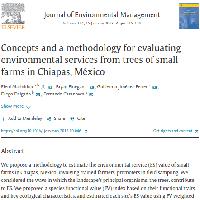Resumen
-
We propose a methodology to estimate the environmental service (ES) value of small farms in Chiapas, Mexico, involving trained farmers-promoters in field sampling. We considered the ways in which the landscape's principal organisms, the trees, contribute to ES. We proposed a species functional value (FV) index based on their functional traits and key ecological characteristics, and estimated each site's ES value using FV weighted by the dimensions and abundance of individuals in different land uses (LU). Tree contribution to carbon storage (C) was defined using species wood density and biodiversity conservation value (BD) using food and habitat provision for wildlife and species existence (non-use) value (EX). Many species and individuals had high C, as wind-dispersed species with dense wood were common, but low BD prevailed, with high BD species common only in riparian forests. Few species and fewer individuals had high EX conferred by dense wood, large size, harvesting pressure and animal dispersal, among others. High variance in value within LU types, suggested that LU is a poor estimator of ES value, and that the measurement of species FV and tree dimensions is essential. This tool accurately reflects the ecological values of farm tree cover, allowing negotiation of compensation for environmental services. This methodology could be implemented combining open-access regional traits databases and field sampling by local people, and can easily be adapted for the measurement of other ES, and to other ecological and cultural contexts.
